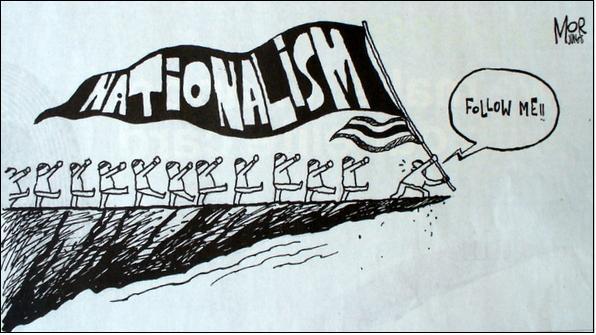Social Studies 20-1 Review (copy)
| Site: | MoodleHUB.ca 🍁 |
| Course: | Social 30-1 RVS |
| Book: | Social Studies 20-1 Review (copy) |
| Printed by: | Guest user |
| Date: | Saturday, 8 November 2025, 8:30 PM |
Table of contents
- 1. Introduction
- 2. Related Issue 1: To What Extent Should Nation be the Foundation of Identity
- 3. Related Issue 2: To What Extent Should National Interest be Pursued?
- 4. Related Issue 3: To What Extent Should Internationalism be Pursued?
- 5. Related Issue 4: To What Extent Should Individuals and Groups in Canada Embrace a National Identity?
- 6. Assignment
- 7. Conclusion
1. Introduction
Social Studies 20-1 Review
Key Issue:
To what extent should we embrace nationalism?
- To what extent should nation be the foundation of identity?
- To what extent should national interest be pursued?
- To what extent should internationalism be pursued?
- To what extent should individuals and groups in Canada embrace a national identity?
Duration- 3 blocks ( 80 mins + homework)
In Social Studies 20-1 you explored the complexities of nationalism in Canadian and international contexts. You also studied the origins of nationalism and the influence of nationalism on regional, international and global relations. The purpose of this lesson is to review the key information from social studies 20-1.
2
2. Related Issue 1: To What Extent Should Nation be the Foundation of Identity
What is a Nation?
You began Social Studies 20 by considering the issue of what is nation. Consider the following:
Country and Nation
Some people believe that country and nation mean the same thing. There are words we use that suggest this is true. For example:
- Nation-state means “country.”
- International means “between countries.”
- Nationalism among other things can mean, “striving for a country.”
- Only countries can be members of the United Nations
The word “nation” was originally a Latin word that meant, “people” or “race.”
Many people believe that the word nation refers to a group of people and is different from the idea of country.
Nation as a Concept
Many academics have tried to define what a nation is. Which views do you agree with?
- The nation is the people.
- Nation emerges from a feeling of belonging.
- The nation is an imagined political community.
- The nation exists when people want self-government.
- The nation expresses the soul of the people.
Nation as a Collective
Another definition is that a nation is a collective — or group — identity. When we use words like “we”, “us,” and “our” it shows that we are thinking collectively.
Nation as a Patriotic Concept
Patriotism means love of your country.
Some people believe that you show patriotism by supporting whatever your country does while others believe patriotism can be expressed by speaking out against problems in your country. Some people love their country so much they would be willing to die for it. Would you?

Flags of the World

Nation as a sense of belonging

Some people love their country so much they would be willing to die for it. Would you?
The French Revolution and its Significant Impact on the Rise of Nationalism
"Many historians believe that the French Revolution marked a turning point in the history of European nationalism. As a result of this revolution, the people of France changed the way their society worked. They beheaded the king and many of the aristocrats who lived in luxury while people who were poor starved - and they transformed France from an absolute monarchy to a republic.
France was the first European country to become a republic. Before the revolution, the king had been the focus of many French people's sense of nation. But the revolution changed this. People began to focus their loyalty on the idea of themselves - the people- as the nation."
Exploring Nationalism by Gardner et all. (2008). p 44
Please watch the following video, What caused the French Revolution by Tom Mullaney, to review the events of the French Revolution.
What caused the French Revolution by Tom Mullaney
To summarize, the French Revolution shifted French citizens' collective consciousness to the idea that they, the people, are the nation. In Social Studies 30 you will look at different ways in which a nation should best be organized.
3. Related Issue 2: To What Extent Should National Interest be Pursued?
National Interest
What are national interests? As you learned in the first unit of Social Studies 20, nation-states or countries have a population composed of citizens with common interests, beliefs and values. That is, if you went out and interviewed Canadians across the nation, you would likely find that their answers to questions about health care, education, government spending and Canada’s role in the international arena would be quite similar, not identical, but close to each other. Shared beliefs and values ensure that government leaders will remain in power only so long as they work toward goals the citizens believe to be important. To learn more about national interest and how national interest is reflected by nations please review the PPT below on National Interest.
Nationalism and Ultranationalism
Some people believe that nationalism is the most powerful political force because at some point, ultranationalists move from valuing their own nation and its interests to hostility toward people of other nations. This hostility can endanger international peace. In Social Studies 20 you were introduced to the concept of ultranationalism, when national interest and ideals become extreme. You also touched on what ultranationalism is, how it develops and historical/contemporary responses. This information will be revisited in Social Studies 30 so pay careful attention!
Ultranationalism, like nationalism involves the devotion to one's nation, but is an extreme form of nationalism. it is often characterized by authoritarianism, efforts toward reduction of immigration, oppression of non-native populations, etc. Ultranationalism often involves the people being fanatically loyal to their nation, and hostile and racist to others nations.
Ultranationalists often promote their own national interests - economic, social and cultural - while ignoring the national interests of other citizens. This exaggerated sense of national interest can cause war, succession and genocide. Throughout history, societies have experienced ultranationalism and all its negative effects, whether it was Russian, under Stalin, or Germany under Hitler.
Russia under Stalin
At the beginning of the 20th century, Russia was an absolute monarchy (remember the French Revolution). The Russian Revolution in 1918 resulted in the assassination of the czar and royal family and launched a civil war that brought even more suffering to millions of people who had already endured great hardship during World War 1.
By 1928, Joseph Stalin, a communist, had emerged as the country's leader. One of Stalin's first acts was to confiscate land owned by farmers and create collective farms owned by the state. Those who objected were executed, and an estimated five million people were deported to forced labour camps in Siberia or Central Asia.
Germany under Hitler
In Germany, Adolf Hitler promised that he would restore people's national pride by making their country the leading nation on earth. A skilled speaker who knew how to capture the attention of an audience, Hitler said he would do this by:
- refusing to recognize the Treaty of Versailles
- rebuilding Germany's armed forces and reclaiming lost territories
- restoring the superiority of the "Aryan race" - white Europeans
Nazi propaganda experts used radio, movies, public address systems, and giant posters to present Hitler's image and message to the public. Party members organized central and neighbourhood mass meetings attracting audiences of up to 100,000. At these meetings, crowds chanted, "Today Germany, tomorrow the whole world."
Please watch the following pictorial essay:


Joseph Stalin

Adolf Hitler
Crimes Against Humanity
The link between ultranationalism and genocide is evident in modern society. In the modern age people kill each other for various reasons, whether it be for land, resources, ethnicity, etc. However, more frequently, the world is seeing
the systematic destruction of a group of people; an act of genocide. Entire groups of people are wiped out because they differ slightly in idea or appearance in comparison to a radical, ultra nationalist party. Often genocide is carried
out because of ultranationalism that is present in a group of people, such as the Nazi Holocaust of World War Two, Stalin's inflicted famine in the Ukrainian, and the Hutus executing the genocide in Rwanda.
Read through the Eight Stages of Genocide presentation and complete your own notes.
That concludes the review notes on related issue two "To what extent should national interest be pursued?" Please proceed to review of related issue three.
4. Related Issue 3: To What Extent Should Internationalism be Pursued?
Nations, Nation-States and Internationalism
Internationalism is a political movement that advocates a greater economic and political cooperation among nations for the theoretical benefit of all. Partisans of this movement claim that nations should cooperate because their long term mutual interests are of greater value than their individual short term needs.
Internationalism is, by nature, opposed to ultra-nationalism. It teaches that the people of all nations have more in common than they do differences, and this that nations should treat each other as equals.

Nations and nation states have many common and conflicting motives. Some nations prefer to concentrate on their domestic policies and virtually ignore the international community, while others are more concerned with global issues. These countries attempt to not only further their own interests through trade, collective security and other methods but they also attempt to assist in alleviating problems globally.
Common Motives of Nations and States Include:
Economic Stability
Peace and Security
Self-Determination
Humanitarianism
- All humans share the same needs and wants. Everyone needs food, water, shelter to stay alive and healthy. Wants are the things that people desire to have even if they do not require it to survive. Needs and wants create a motive for people to go out and find jobs so they can make money, to fulfill these needs and wants.
- Nations work the same way. Governments are motivated to fulfill the needs of their citizens by trying to provide economic stability. Peace and security, self-determination, and humanitarian activities.
- Abraham Maslow believed that people followed a unique pattern or hierarchy. He believed that once people have satisfied their basic needs, they can focus on their wants.
 I
I
Economic Stability
Positive effects of high employment. If there are more jobs there are
more people with money to spend. If companies have more people buying
their products there is more demand, which means that there is a higher
demand for the companies to produce more products. In order for a
company to make more products, they need to hire more people to work,
and so the cycle continues.
Peace and Security
Abraham Maslow believed that safety and security was the second most
important need, because it’s hard to be happy if there is a war going on
in your backyard. Many counties have charters or rights so that people
know that they have the right to live safely. This also helps settle
legal disputes. Countries also have armies or military forces that
protect the country.
Self Determination
Most people like to control their own lives so when governments do not
allow this to happen, the sovereign nations begin to emerge and start
their own country. This is common when some nations only allow one
religion to be followed in the country.
Humanitarianism
- Many people in the world feel sympathy for those who are less fortunate. These people start organizations like food banks so they can help out the less fortunate.
- Natural disasters, disease, wars and conflict can all cause suffering for people. Disasters such as tsunamis can destroy towns in a matter of seconds, killing many people and leaving others injured or stranded.
How do the motives of nations and states shape their responses to the world?
- Countries' withdrawal from contact was one of the reasons Adolf Hitler expanded Germany’s territory, and continued to persecute the Jews.
- A country's complete isolation from the rest of the world is known as isolationism. Japan was a good example of that until 1854, when the United States started trading with them.
- Unilateralism was an issue after WWII, because a nuclear arms race started, and countries just decided to disarm their nuclear weapons to avoid nuclear war.
- Bilateralism is an agreement, or a goal that two persons, or countries can work together, to accomplish, a goal such as Canada and the United States trying to fight against global warming.
- Multilateralism is when countries gather together because of an interest or common goal that they can work together to accomplish.
- Supranationalism is when countries change something so they are more uniform. Ex. The majority of European countries adapted to using the Euro. (previously, they all used separate currencies
Please watch this crash course video discussing American Foreign Policy as it highlights many of the motives of nations and nation states (economic stability, peace and security, etc) as well as the different methods countries use to achieve their national interest (such as isolationism, bilateralism, etc).
In
countries with dictators, setting foreign policy is relatively easy
because they can make decisions without consulting the people.
With
democracies, setting foreign policy is a more complex process that must
reflect the beliefs, values and goals of the country's citizens.
Clear foreign policy goals help guide the actions of the government. In 1995, foreign affairs and international trade Canada published a review
of the Canadian foreign policy. This report highlighted the importance
of setting goals that reflect the values of a country's citizens. It
said, "only states with clear objectives, acting on a strong domestic
consensus, will be able to deploy significant influence and play an
effective role in this new world."
Internationalism and Nationalism
Many of the forces that shape globalization such as trade,
transportation and improved communications also shape the growth of
internationalism. Each of these forces increases contact among
countries at both governmental and non-governmental levels. Some people
believe increased contact to have both positive and negative
consequences. It may promote internationalism and cooperation among
countries but it may also erode the sovereign power of nation states.
Please go through the PPT below to review more about how changing world conditions promote the need for internationalism. This information will be useful to you in Social Studies 30, when you look at contemporary issues through the lens of whether or not liberalism is viable.
Internationalism and Nationalism PPT
In summary, many contemporary global issues are so complex that even national governments are unable to deal with them. For this reason, countries often choose to work with the international community to tackle challenges such as poverty, hunger, disease, debt, climate change, human rights and conflict.
5. Related Issue 4: To What Extent Should Individuals and Groups in Canada Embrace a National Identity?
Visions of Canada
"Canadians have been trying to define Canada's identity since before Confederation. Some, for example, argue that certain beliefs, values, and traditions make Canadians different from citizens of other countries. Others say that Canada includes many identities. Still others argue that there is no such thing as a Canadian identity. Those who believe this say that Canada is so big and includes people from so many cultural backgrounds that Canadians have little in common. Though they acknowledge the existence of a nation-state called Canada, they do not believe that a Canadian nation exists."
Exploring Nationalism, Gardner et al. (2008). p300
The following are historical visions of Canada:
- Canadian identity and geography- Canada's rugged geography is fundamental to the Canadian spirit
- One Canada- circa the John Diefenbaker era starting in 1956
- Pluralistic and Multicultural- one element of Canada's identity
- Communities and Nations within a Nation- Joe Clark era starting in 1979
Promoting Canada's National Identity
Myths, institutions and government programs and initiatives have been
used to promote a national identity, equally important individuals can promote a
national identity, consider, for example, Terry Fox.

The Quest for Canadian Unity
The Canadian government must often face the challenging demand of
meeting the various needs of all of the country's citizens. Even when
citizens share similar goals, they may not agree on the most effective
way of achieving them.
The nature of Canada affects national unity. Consider the following:
- The geography of Canada- Canada is huge, it stretches from the Arctic and Pacific seacoasts, over tundra and mountains, across prairies, past the Canadian Shield and the St. Lawrence lowlands, to the Appalachian region and the Atlantic cost.
- Western alienation- regional needs often dictate how the federal government allocates money for federally funded programs. In addition, the federal government's objectives do not always match the goals of people in specific regions. These realities can foster the belief that Confederation has not benefitted all Canadians equally.
- Quebec sovereignty and national unity- one of the greatest challenges to Canadian national unity has been the rise of Quebec nationalism.
- Aboriginal self-determination and national unity- aboriginal peoples believe that self-determination is an inherent right- a right that exists because they occupied their land and governed themselves for thousands of years before the arrival of Europeans in North America.
Moving forward, visions of Canada must take into account that we are a pluralistic society that embraces an inclusive approach that is characterized by respect for diversity. It assumes that diversity is beneficial and that cultural, religious, spiritual, ideological, gender, linguistic, environmental, and philosophic groups should enjoy autonomy.
6. Assignment

Assignment One of One (27 marks)
Please complete the Social Studies 20 Review Quiz.
The Social Studies 20 Review Quiz is open book and I encourage you to use the notes from your lessons to help you complete the quiz.
7. Conclusion
Congratulations you have now completed your review of Social Studies 20. The information covered in this lesson will be helpful as you move forward into Social Studies 30.